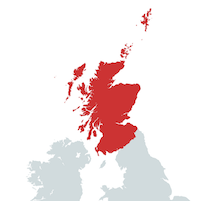
Map by mapchart.net - Some rights reserved.
Location
Stonehaven, Aberdeenshire, Scotland
Description
There are two access trails to Dunnottar. The shortest is a 800 metre path with several staircases from a car park on the coastal road off the A92. The other is a three kilometre walk from Stonehaven Harbour along a path that heads south along the cliff top to the castle. This path is narrow and steep in parts and has expansive sea views.
Dunnottar Castle is situated in a dramatic setting on a cliff top near Stonehaven in Aberdeenshire. The castle fortress is now in ruins, but still an impressive sight. The castle remains includes the keep, the barracks, lodgings, stables and storehouses, chapel and drawing room. The Castle was the home of the Earls Marischal once one of the most powerful families in the land. The last Earl was convicted of treason for his part in the Jacobite rising of 1715, and Dunnottar was seized by the government. The buildings were much neglected until 1925 when the 1st Viscountess Cowdray started restoration work. The Castle is open to visitors.
History
During the 9th Century King Donald II was killed defending Dunnottar Castle from a Viking invasion. The Vikings seized and destroyed the Castle. In the 12th Century Dunnottar Castle became a Catholic settlement. At various times, William Wallace, Mary Queen of Scots, the Marquis of Montrose and the future King Charles II, all stayed at the Castle.
When Oliver Cromwell invaded Scotland in 1650, Scottish Crown Jewels, the 'Honours of Scotland' were stored at Dunnottar Castle. Cromwell's army attacked the castle, and a small garrison held out for eight months and saved the jewels from destruction. The crown, sceptre and sword are now in Edinburgh Castle.
In 1685,167 Covenanters were imprisoned in the Whig's Vault below one of the buildings in the Quadrangle. Some took the oath of allegiance and were released, others died of starvation or died trying to escape. The rest were transported to the colonies.
Legends
The site of the Castle was of significance to the Picts. The spirit of a Pictish "green lady" has been seen in the brewery at the Castle. She is said to be looking for her "lost children" who are the Picts who converted from her religion to Christianity around the 5th Century AD.
Other Castles in the Area
Crathes Castle, Aberdeenshire
Drum Castle, Aberdeenshire
Drumtochty Castle, Aberdeenshire
Fasque Castle, Aberdeenshire
Midmar Castle, Aberdeenshire
Muchalls Castle, Aberdeenshire
|
|
|
|

